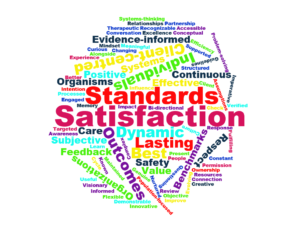Quality forms the very fabric of community mental health and addictions service provision, with principles such as person-centered care being a common thread across over 250 providers in Ontario. Organizations within our sector have been proactive and innovative in implementing quality improvement (QI) methods to improve the service experience for the clients and families we serve. However, as a sector, there lacked a coordinated approach to quality improvement.
Enter the Excellence through Quality Improvement Project (E-QIP). E-QIP is a groundbreaking 18-month partnership project between Addictions and Mental Health Ontario, the Canadian Mental Health Association, Ontario and Health Quality Ontario.
E-QIP aims to support the growth and development of a unified quality-improvement culture within the community mental health and addictions sector and provide the tools and resources to help the sector translate that culture to practice.
This transformative step for the sector aids in the ongoing development of services that are more accountable to government, funders and – most importantly – to individuals and their families who put their trust in our services every day.
E-QIP’s mission has been to increase the understanding of quality in mental health and addictions care and to increase sector-wide QI learning and mentorship. The initiative also seeks to highlight promising practices from within the sector and build readiness to embrace the principles of the Excellent Care for All Act.
E-QIP’s Foundational Principles
E-QIP is based in prevalent theories and approaches that foster a quality improvement culture in health care. Firstly, E-QIP’s work is based in the Model for Improvement, a common theoretical basis for initiating, planning and executing quality improvement work. The model suggests that all quality improvement work should address three standard questions:
- What are we trying to accomplish?
- How will we know that a change is an improvement?
- What changes can we make that will result in improvement?
This model also recognizes that to make sustainable and meaningful changes, quality, like the communities we serve, is constantly evolving and improvement is a continuous process.
Secondly, the work of E-QIP is grounded in the six domains of quality as laid out by Health Quality Ontario, a provincial body tasked with bringing about meaningful improvement in health care. The domains dictate that high-quality health care should strive to be: safe, effective, patient-centred, efficient, timely and equitable. These dimensions are based on a framework for outcomes of a high-quality health care system and are a common way of thinking about health care.
Finally, by approaching QI using the Model for Improvement and six domains of quality, E-QIP is supporting the achievement of the Quadruple Aim of creating services and programs that will result in: 1) better care for individuals; 2) lower costs through improvement; 3) increased provider satisfaction; 4) healthier communities.1 This fourth component of health care is particularly important to E-QIP, as our initiative recognizes the importance of staff well-being, in a sector that is often under resourced yet very high in demand.
Collaboration a Key to Success
One of the aspects of E-QIP that makes the initiative unique is a focus on engaging with, learning from and collaborating with stakeholders and service providers from across the province. When we first launched E-QIP in spring 2016, we conducted 21 key informant interviews, received 77 survey responses and held seven regional consultations across the province. The results of these efforts were used to design the offerings that E-QIP would provide to the sector.

Among the information gleaned from the initial engagement activities was an acknowledgement that the sector is vitally under-resourced, with only 46 percent of responding agencies indicating that they have dedicated QI staff and only 22 percent stating that they have a formal model for conducting QI. Respondents indicated that the biggest barriers to QI were resources, expertise and data analytics. However, 90 percent of agencies identified that QI is a priority.
In response to the needs of our sector, E-QIP developed and offered four types of supports to build QI capacity and implement QI methods: agency-specific coaching; an online Collaborative Community of Practice; access to the Institute for Healthcare Improvement open school (an online resource for QI learning); and, in-person and web-based QI training and education opportunities.
Four Types of QI Support
- Coaching – Both project-specific coaching and general QI and data support, has been provided to organizations by way of both QI and data coaches seconded directly from community mental health and addictions agencies. QI and data coaches have supported agencies as they work through identified areas for improvement, starting from the initial stage of diagnosing a root cause through to testing change ideas aimed at improvement.
- Collaborative Community of Practice (CCoP) – Particularly critical for sustainability, the CCoP has been built as a place where those working within our sector can come together and discuss QI, promising practices and share resources as they relate to community mental health and addictions work.
- Institute for Healthcare Improvement (IHI) open school – This IHI resource provides learning opportunities for those in our sector to increase their knowledge about international developments in QI.
- In-person and web-based educational opportunities – These modules of learning have included introductory training in QI, leadership and change management, experience-based co-design, as well as monthly webinars.
E-QIP has been working together with community mental health and addictions service providers to support the high-quality services offered to clients and families everyday. Through E-QIP’s multi-pronged approach to supporting QI, our project has engaged with a broad audience, igniting the strong desire of our sector to continually strive to improve.
Michael Dunn, Director of Quality Improvement at the Canadian Mental Health Association Ontario, and Sandra Cunning, the Director of Quality Improvement at Addictions & Mental Health Ontario, are the co-leads of the Excellence through Quality Improvement Project (E-QIP).
1 Bosenheimer, T. & Sinsky, C. (2014). From Triple to Quadruple Aim: Care of the Patient Requires Care of the Provider. Annals of Family Medicine, 12, 573-576. doi: 10.1370/afm.1713
